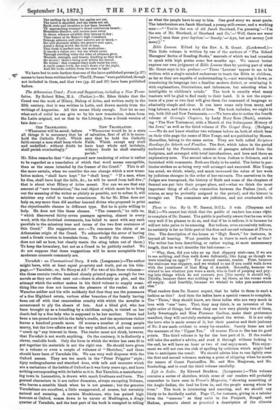Managers' Series of Reading-Books," manuals of which we had occasion
to speak with high praise some few months ago. We cannot better express our own judgment of Bible Lessons than by quoting part of what
Mr. Grant says in his preface :—" These ` Lessons ' appear to me to be written with a single-minded endeavour to teach the Bible to children, as far as they are capable of understanding it,—not watering it down, or translating its language into a familiar modern dialect, or overlaying it with explanations, illustrations, and inferences, but selecting what is intelligible to children's minds." The book is exactly what many teachers will be glad to find ready to their hand. It is not the exper- ience of a year or two that will give them the command of language so admirably simple and clear. It can have come only from many, and long labours, and these a work of love. The book includes, we ought to
say, both Old and New Testaments.—We have also to notice the fourth volume of Granny's Chapters, by Lady Mary Ross (Bash), contain-
ing "The New Testament, with a Sketch of the Subsequent History of
the Jews," as well as the third volume of The Gospel Story. (Hodges.) —We do not know whether two volumes before us, both of which bear
on their title-page the name of Miss Tongs, and are published by Messrs.
Macmillan, belong to the same series. They are both called Scripture Readings for Schools and Families. The first, which takes in the period
embraced by the Pentateuch, consists of passages selected from the Scripture, and arranged with brief introductions, and here and there an explanatory note. The second takes us from Joshua to Solomon, and is furnished with comments. Both are likely to be useful. The latter in par- ticular strikes us as being very well arranged and executed. Miss Youge has acted, we think, wisely, and much increased the value of her work by judicious changes in the order of her extracts. The narratives in the Judges are transposed, the history of Ruth and some of the chapters of Samuel are put into their proper place, and—what we think the most important thing of all—the connection between the Psalms (such, of course, as may be probably assigned to the period), and the history is brought out. The comments are judicious, and not overloaded with matter.


































 Previous page
Previous page